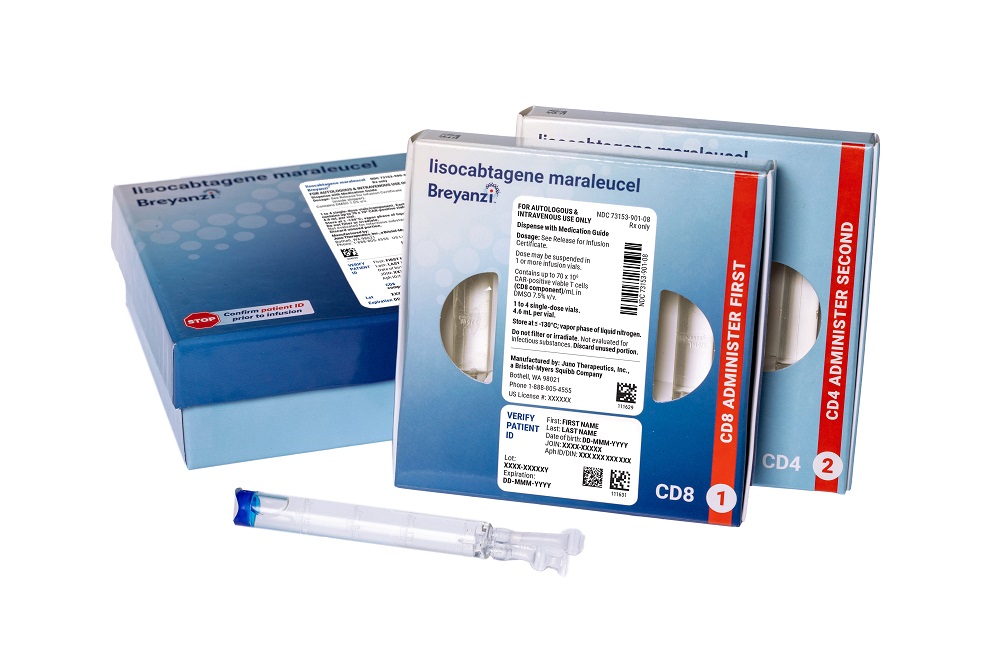
A Bristol Myers Squib cancer drug made by engineering a patient’s own immune cells is now approved to treat patients in earlier stages of their disease, a regulatory decision that expands the number of patients that can be reached with this type of personalized cell therapy. The decision could also give BMS an edge over a rival cell therapy marketed by Gilead Sciences.
The CAR T-therapy from BMS, named Breyanzi, was initially approved last year as a treatment for diffuse large B-cell lymphoma, (DLBCL) a type of non-Hodgkin lymphoma in which the body produces abnormal B lymphocytes. Standard treatment is chemotherapy plus the antibody drug Rituximab. When that treatment doesn’t work or the cancer relapses, the next treatment option is an autologous stem cell transplant.

With the Rise of AI, What IP Disputes in Healthcare Are Likely to Emerge?
Munck Wilson Mandala Partner Greg Howison shared his perspective on some of the legal ramifications around AI, IP, connected devices and the data they generate, in response to emailed questions.
Breyanzi’s initial approval made it a third-line treatment for DLBCL patients whose cancer relapsed or has not responded to two earlier therapies. The expanded approval of the drug, announced late Friday, moves the drug up in the treatment hierarchy and makes it a second-line therapy for patients whose disease has relapsed within 12 months of the initial chemotherapy regimen. That matches the expanded approval earlier this year of Gilead Sciences’ cell therapy, Yescarta. Furthermore, Breyanzi’s additional approval also covers those who are not eligible for a stem cell transplant.
Leo Gordon, an investigator in Breyanzi’s PILOT study and a professor of medicine at Northwestern University, said factors that may make patients bad candidates for a stem cell transplant include age, poor kidney or heart function, or low scores according to an assessment of frailty. Usually, such patients would receive palliative care to ease the cancer’s symptoms.
“We thought there was a possible place for CAR T-therapy,” Gordon said during an interview earlier this month at the annual meeting of the American Society of Clinical Oncology. “The purpose of this is to get another option for patients for what is considered to be the standard [of care treatment]. That’s why this is an important group to look at.”
CAR T-therapy is a personalized treatment made by harvesting a patient’s T cells and engineering them to target a protein on the surface of cancer cells. Those immune cells are multiplied in a lab and then infused back into the patient. Expanded approval of Breyanzi was based on the results of two studies evaluating the drug as a second-line therapy.
The TRANSFORM study evaluated Breyanzi in 184 patients still eligible for a stem cell transplant. The main goal was to measure how long a patient remains free of certain cancer complications. At one year, 45% of patients treated with Breyanzi achieved this mark compared with 24% of those who received standard therapy. Event-free survival in the treatment group was an estimated 10.1 months compared with 2.3 months in the control arm. Of those patients who received standard treatment, nearly half went on to receive an autologous stem cell transplant.
Measuring complete response and overall response were the main goals of PILOT, an open-label study that enrolled patients with a median age of 73. Gordon said that efficacy in PILOT was similar to what was observed in healthier and younger patients who were evaluated in tests of the drug as a third-line therapy. The median duration of response has not yet been reached, but in the 61 patients, 54% achieved a complete response. “That is actually better than what we would expect for a transplant,” Gordon said.
The major safety risks of CAR T-therapies as a class include an immune response called cytokine release syndrome and toxic effects in the brain. Gordon said the cytokine release syndrome cases observed in the latest Breyanzi study were mild to moderate. While some patients had severe neurotoxicity, Gordon said no one had to go to the intensive care unit and everyone recovered. About 20% of patients were treated on an outpatient basis.
In a research note sent to investors on Monday, William Blair analyst Matt Phipps noted that compared to Yescarta, Breyanzi’s broader label as a second-line treatment gives it access to a bigger pool of patients that Gilead’s drug is not approved to treat.
“We assume around 40% of patients are refractory or will relapse at some point following first-line therapy, and with 50% of these patients being transplant ineligible, around 6,000 patients per year could be eligible for Breyanzi based on PILOT,” Phipps wrote. “Thus, this approval clearly provides Bristol Myers with a bigger opportunity with less CAR T-competition.”
Breyanzi accounted for $87 million in total revenue in 2021, according to BMS’s financial reports. For the first quarter of this year, the drug tallied $44 million in sales. Phipps said that Breyanzi’s new approval and broad label are positive signs for BMS as the company looks to other drugs that can offset patent expirations facing key products in coming years. He added that BMS projects Breyanzi could top $3 billion in annual sales by the end of the decade.
Photo by Bristol Myers Squibb














